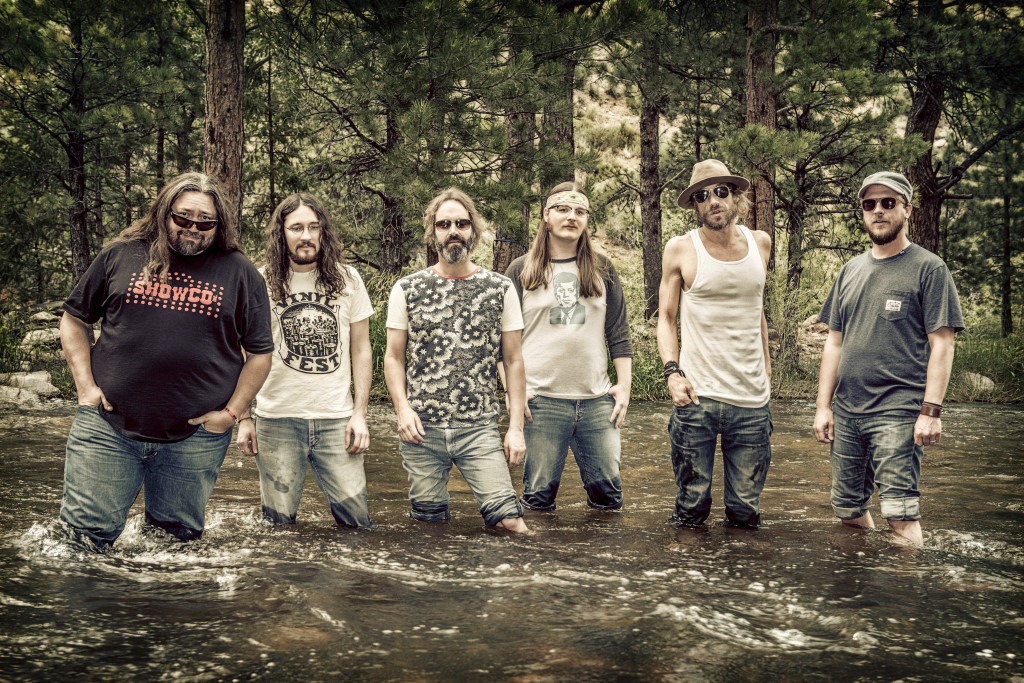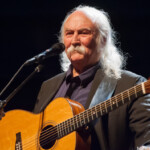
The Hard Working Americans by Jay Blakesberg
By Jon Kleinman
[T]here’s a touch of humor in Dave Schools’ voice as he reflects on the beginnings of super group Hard Working Americans. “It’s the story of a folk singer with hobo chic who’s also a fan of jam bands,” recalls the veteran bassist and producer. “Jam bands get made fun of for not having songwriting chops. Some singer/songwriters are poets who can barely play guitar. Todd Snider liked both worlds, so he asked, “Why can’t I mix that chocolate with my peanut butter?”” Guitarist Neal Casal first met Todd Snider when he was on tour with the Chris Robinson Brotherhood. Snider attended a show at San Francisco’s Great American Music Hall, and the two musicians met backstage. When Hard Working Americans formed in 2013, Casal was invited on board as a guitarist. “It was a pretty easy “Yes!”” he remembers.
When Casal looks back on recording Hard Working Americans’ self-titled debut, he’s struck by how quickly the band’s signature sound came together. “We all met in the studio, and started making the debut album that same day. There was an immediate chemistry and a strong sense that we were all going to be friends. We weren’t just musicians working on a project together – we were a band. That’s a special feeling.” Schools expressed a similar sentiment. “For a band to succeed, there has to be a sense of openness. There’s no formula – just an openness and a willingness to experiment. We listen to each other, and we’re willing to follow Todd down any rabbit hole he chooses.”
Hard Working Americans, a 2013 set of carefully chosen covers, earned the band a great deal of critical acclaim. When they recorded the live album The First Waltz, the original lineup of Todd Snider, Neal Casal, Dave Schools, Chad Staehly and Duane Trucks were joined by guitarist Jesse Aycock. With the addition of a second guitarist, the group’s sound blossomed. “Jesse and I are both after the same thing,” states Casal. “We’re not soloing for ourselves – we’re all about the song. Bands like the Grateful Dead and the Rolling Stones were about two guitarists’ voices weaving together as one. I’m old school. I don’t ever want to be the only guitar player in a band. Jesse shares that mind set, and that’s why we work together so well.”
With earthy material like Frankie Miller’s “Blackland Farmer,” Hayes Carll’s “Stomp and Holler” and, on The First Waltz, a spirited reading of Merle Haggard’s “Workingman Blues,” the band’s first two albums feel like a celebration of the common man – a rock and roll version of The Grapes of Wrath. On Rest In Chaos, the focus turns inward as Snider wrestles with personal demons. “Todd was going through a tumultuous period in his life, and it shows in the lyrics,” Casal notes. It was up to the rest of the band to put the listener in Todd’s skin. “We went into the studio with no idea what we were going to do,” recalls Casal. “Todd had a huge pile of lyrics, because he writes incessantly. In the studio, we conjured up the music out of thin air – it was like alchemy. The music just flowed out.”
“We tried to create an evocative atmosphere for Todd’s words,” says Schools. “We weren’t providing accompaniment or creating a melody – we were trying to give the listener a sense of where this character named Todd Snider is. It was one of the most fulfilling recording projects I’ve ever worked on.” Like Casal, Schools has a deep admiration for Todd Snider’s work ethic. “I came out of the recording process with an undeniable appreciation for what Todd puts himself through as a craftsman. The self-editing process is brutal. He’s a poet and a songwriter. To him it’s not just a craft, but a calling.”
Both Casal and Schools were eager to offer insights into some of the most striking tracks on Rest In Chaos. “Ascending Into Madness” is one of Snider’s most heartfelt meditations on sobriety and sanity. According to Casal, “The track was recorded in Chicago in the middle of an ice storm. Todd was at the epicenter of his divorce. That’s where a lot of the feeling in that track came from.” Schools recalls that “the atmosphere of the song dialed itself in. As a producer, I augmented it with a lot of help from the amazing musicians in our band. There are great backing vocals from Jesse, Neal and guest Elizabeth Cook.”
“Roman Candles” gives listeners another glimpse of Snider’s philosophical side with its zen koan-like chorus, “When in Rome/they say “Shoot roman candles’/that way nobody thinks you’re crazy.” Casal notes, “Todd had a basic framework for the arrangement in mind, and Jesse Aycock and I worked to give it a touch of southern grease.” Schools recalls, “The take that made the record was something very special that was recorded in Nashville. Neal came up with a guitar riff, and the song just fell into the arrangement we created. Most of what’s on the album is the original studio take – there was only minimal embellishment and overdubbing.”
The darkest, most intense track on Rest In Chaos is “Acid,” a song about the infamous hippie cult leader and mass murderer Charles Manson. In Casal’s words, “Acid” was an example of Todd’s brilliance – not just his lyrics, but in where he finds inspiration. He watched a video of an interview with Charles Manson, and decided to write a song about it. We knew what Todd was after, and whipped up a piece of music that went for broke.” Schools remembers, “It was recorded at midnight on our final session. The extended noise jam at the end was just us being musicians. It was fun! I came into the studio the next morning, and the house engineer had the entire studio staff in the control room listening to that track.”
Like Schools, Casal considers the band’s work on Rest In Chaos to be a special experience. “Being a musician is hard work, and that’s what Rest in Chaos is about. These songs meant everything to Todd. He could have chosen to do a solo album, but he didn’t. He trusted us with some of his most personal lyrics, and we didn’t take that lightly. Making this album was a privilege, and that was never lost on us.” With a growing body of work and a busy touring schedule, Hard Working Americans are ready to give more listeners the privilege of enjoying their music.







Be the first to comment!